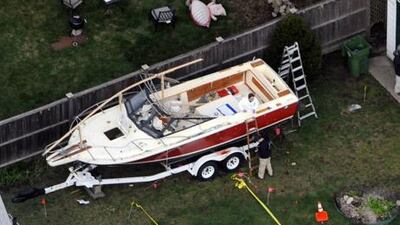The suspect in the Boston Marathon bombings who was killed by police wanted to stay in Russia reading the Quran rather than return to the US last year at his father's insistence, a relative said.
Tamerlan Tsarnaev, 26, a US resident from Russia's mainly Muslim North Caucasus region, started getting seriously into Islam a couple of years ago, Patimat Suleimanova, an aunt, told reporters in Makhachkala, Dagestan.
"He wasn't religious as a child," said Mrs Suleimanova, 62. "That happens when a person's soul is lacking something."
Tsarnaev and his brother Dzhokar, 19, are accused of planting two bombs that exploded about 10 seconds apart near the finish line of the Boston Marathon on April 15, killing three people and wounding at least 170 more. The elder brother was killed as they both tried to escape a dragnet early April 19.
Dzhokar is in serious condition in the hospital, unable to speak due to injuries to his neck and tongue sustained while on the run.
Mrs Suleimanova, who is married to the older brother of the suspects' mother, said Tamerlan returned to Makhachkala last year to practise sports and intended to stay in Dagestan if he liked it. After about half a year, though, his father told Tamerlan to go back to the US to take care of Dzhokar and his two younger sisters, Mrs Suleimanova said.
"He would have happily stayed here," Mrs Suleimanova said. "Then this would've never happened and he wouldn't have died."
Tamerlan spent most of those six months in Makhachkala reading the Quran, aside from a few visits to relatives in other parts of Dagestan and in the neighbouring region of Chechnya, the family's ancestral homeland, according to Mrs Suleimanova. The parents of the brothers are both lawyers by training who have a local perfume business, she said.
Tamerlan had been brought to the attention of the US Federal Bureau of Investigation two years ago by a foreign government concerned he held extremist Islamist beliefs, the agency said in a statement. A US law enforcement official identified Russia as that foreign government. The FBI said it found no evidence of terrorist activity at the time.
US authorities believe the two bombing suspects were acting alone and so far haven't found connections to any groups or other suspects, said a person briefed on the investigation who asked not to be identified.
An Islamic rebel group that claims to represent what it calls the Dagestan Province of the Caucasus Emirate denied any link to the Boston bombings.
"The Caucasian Mujahedeen are not fighting with the United States of America," the group said in a statement posted on the Vdagestan.com website yesterday. "We are at war with Russia, which is responsible not only for the occupation of the Caucasus, but also for heinous crimes against Muslims."
Mrs Suleimanova said neither she nor other members of the family think the brothers are guilty of the bombings.
"We don't believe what we've seen on television," she said. It was probably a "suicide bomber."
Investigators said yesterday they believe the bombing suspects were planning other attacks based on the cache of weapons uncovered. Ed Davis, Boston's police commissioner, said that authorities found an arsenal of homemade explosives after a gun battle between police and the suspects in the suburb of Watertown early Friday.
*Bloomberg News with additional reports from Associated Press

